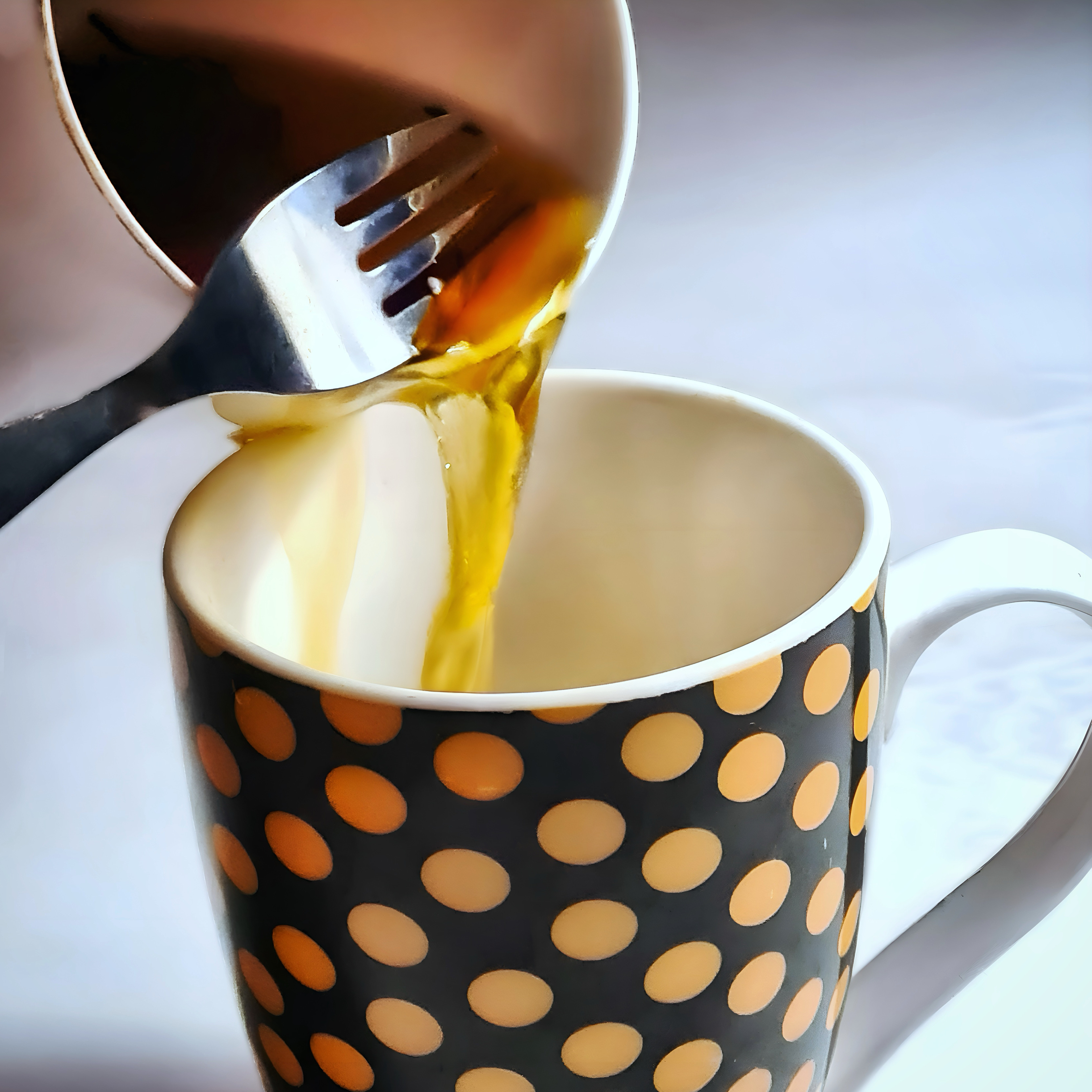Did you know that Yemen is one of the oldest tea-producing countries in the world? According to some sources, tea was introduced to Yemen by the Persians in the 6th century CE, and has since become an integral part of Yemeni culture and cuisine. Yemeni tea, or Adeni Chai, is a distinctive blend of black tea, milk, and spices that is enjoyed throughout the day and night. In this article, we will explore the fascinating history, culture, and taste of Yemeni tea, and show you how to make your own cup of Adeni Chai at home.

The Cultural Significance of Yemeni Tea
Tea has a long and rich history in Yemen, dating back to the ancient times when Yemen was a major trading hub for spices, incense, and other commodities. It was actually a valuable and prestigious item that was often used as a currency or a gift. Tea would often be used as a symbol of hospitality and generosity, as hosts would offer their guests a cup of tea as a sign of respect and friendship.
Tea is still a vital part of Yemeni daily life and customs, especially in the southern port city of Aden, where Adeni Chai originated. ‘Adeni Chai’ is a strong and sweet tea that is brewed with black tea leaves, milk, sugar, and a variety of spices, such as cardamom, cloves, cinnamon, ginger, and saffron. It is typically served in small glasses or cups, and is often accompanied by biscuits, bread, or dates.
Understanding Yemeni Tea: Adeni Chai
Adeni Chai is a complex and flavorful tea that has a distinctive taste and aroma. To make Adeni Chai, you will need the following ingredients:
- Black tea leaves: The base of Adeni Chai is a strong black tea, such as Assam, Ceylon, or Darjeeling. You can use loose tea leaves or tea bags, depending on your preference.
- Milk: Milk adds creaminess and richness to Adeni Chai. You can use any type of milk, such as cow, goat, or plant-based milk, as long as it is full-fat and unsweetened.
- Sugar: Sugar adds sweetness and balance to Adeni Chai. You can use white, brown, or raw sugar, or any other sweetener of your choice, such as honey, maple syrup, or agave nectar.
- Spices: Spices are the soul of Adeni Chai, and give it its unique flavor and aroma. The most common spices used in Adeni Chai are cardamom, cloves, cinnamon, ginger, and saffron. Cardamom is the dominant spice, and adds a warm and fragrant note to the tea. Cloves add a spicy and pungent kick, while cinnamon adds a sweet and woody touch. Ginger adds a zesty and fiery edge, and saffron adds a subtle and floral hint. You can use whole or ground spices, or a combination of both, depending on your preference.
Adeni Chai has a rich and smooth texture, a dark and reddish-brown color, and a sweet and spicy taste. The tea has a strong and aromatic smell, with notes of cardamom, cloves, cinnamon, ginger, and saffron. Adeni Chai is a full-bodied and satisfying tea that can be enjoyed at any time of the day, but especially in the morning or in the evening.
How to Make Yemeni Tea (Step-by-Step Guide)
Making Adeni Chai is not difficult, but it does require some patience and attention. Here is a step-by-step guide on how to make authentic Adeni Chai at home:
Preparation Overview
The process of making Adeni Chai involves two main steps: brewing the tea and adding the milk. The tea is brewed in a pot with water, sugar, and spices, and then strained into a kettle. The milk is heated in a separate pot, and then added to the kettle. The tea and milk are then boiled together for a few minutes, and then served in small glasses or cups.

Ingredients Needed
To make Adeni Chai, you will need the following ingredients and tools:
- 4 cups of water
- 4 teaspoons of black tea leaves or 4 tea bags
- 4 tablespoons of sugar or any other sweetener
- 8 cardamom pods or 1 teaspoon of ground cardamom
- 4 cloves or 1/4 teaspoon of ground cloves
- 2 cinnamon sticks or 1/2 teaspoon of ground cinnamon
- 1 inch of fresh ginger or 1/4 teaspoon of ground ginger
- A pinch of saffron or turmeric (optional)
- 4 cups of milk
- Small glasses or cups
Step-by-Step Instructions
Follow these steps to make Adeni Chai:
- In a large pot, bring the water to a boil over high heat.
- Add the tea leaves or tea bags, sugar, cardamom, cloves, cinnamon, ginger, and saffron or turmeric, and stir well.
- Reduce the heat to low, and simmer the tea for about 15 minutes, or until it is dark and strong.
- Strain the tea into a kettle, and discard the tea leaves or tea bags and the spices.
- In a small pot, heat the milk over medium heat, stirring occasionally, until it is hot but not boiling.
- Add the milk to the kettle, and stir well.
- Place the kettle over high heat, and bring the tea and milk to a boil, watching carefully to avoid overflowing.
- Reduce the heat to low, and simmer the tea and milk for about 10 minutes, stirring occasionally, until it is well-blended and frothy.
- Turn off the heat, and ladle the tea into small glasses or cups, leaving some space for the foam.
- Enjoy your Adeni Chai while it is hot and fresh.
Serving and Enjoying Adeni Chai

Adeni Chai is traditionally served in small glasses or cups, with a generous amount of foam on top. The foam is considered a sign of a well-made tea, and is often enjoyed by dipping a piece of bread or a biscuit into it. Adeni Chai is usually served with a spoon, so that the drinker can stir the tea and adjust the sweetness and spiciness to their liking.
Adeni Chai can be enjoyed on its own, or with a variety of accompaniments that enhance its flavor and texture. Some of the common foods or snacks that pair well with Adeni Chai are:
- Biscuits: Biscuits are a classic and simple choice that can be dipped into the tea or eaten separately. You can use any type of biscuit, such as plain, butter, or chocolate, or try some Yemeni biscuits, such as ka’ak or bint al-sahn, which are sweet and flaky pastries.
- Bread: Bread is another staple that can be dipped into the tea or eaten separately. You can use any type of bread, such as white, whole wheat, or sourdough, or try some Yemeni breads, such as malawah or khubz, which are flat and soft breads.
- Dates: Dates are a natural and healthy sweetener that can be added to the tea or eaten separately. You can use any type of date, such as medjool, deglet noor, or ajwa, or try some Yemeni dates, such as al-makha or al-barihi, which are dark and chewy dates.
- Cheese: Cheese is a savory and creamy contrast that can be added to the tea or eaten separately. You can use any type of cheese, such as cream, cheddar, or mozzarella, or try some Yemeni cheeses, such as jibneh or nabulsi, which are soft and salty cheeses.
Tips & Tricks
If you want to put your own twist on the traditional recipe, you can experiment with different ingredients and methods. For example, you can:
- Add or omit spices: You can customize the spice level and flavor of your Adeni Chai by adding more or less of the spices, or by using different spices, such as nutmeg, star anise, or black pepper.
- Use different types of tea: You can change the base of your Adeni Chai by using different types of tea, such as green, white, or herbal tea, or by using flavored tea, such as vanilla, mint, or chai.
- Use different types of milk: You can alter the texture and taste of your Adeni Chai by using different types of milk, such as skim, almond, or coconut milk, or by using flavored milk, such as chocolate, caramel, or strawberry.
- Add toppings or garnishes: You can enhance the appearance and aroma of your Adeni Chai by adding toppings or garnishes, such as whipped cream, nuts, dried fruits, or fresh herbs.
Health Benefits
Adeni Chai is not only a tasty drink, but also a healthy one. The ingredients of Adeni Chai have various health benefits, such as:
- Black tea: Black tea is a good source of antioxidants, which can protect the cells from oxidative stress and inflammation. Black tea can also boost the immune system, lower the blood pressure, and improve the cardiovascular health.
- Milk: Milk is a good source of protein, calcium, and vitamin D, which can support the bone health, muscle growth, and immune function. Milk can also help with digestion, hydration, and weight management.
- Sugar: Sugar can provide a quick and easy source of energy, especially for the brain and the nervous system. Sugar can also improve the mood, reduce stress, and enhance the memory and concentration.
- Spices: Spices have various medicinal and therapeutic properties, such as:
- Cardamom: Cardamom can help with digestion, nausea, bloating, and gas. Cardamom can also improve the breath, the oral health, and the respiratory health.
- Cloves: Cloves can help with pain, inflammation, infection, and toothache. Cloves can also improve the blood circulation, the metabolism, and the immune system.
- Cinnamon: Cinnamon can help with blood sugar, cholesterol, and blood pressure. Cinnamon can also improve the brain function, the skin health, and the antioxidant status.
- Ginger: Ginger can help with digestion, nausea, vomiting, and motion sickness. Ginger can also improve the blood circulation, the inflammation, and the immune system.
- Saffron: Saffron can help with depression, anxiety, mood swings, and insomnia. Saffron can also improve the vision, the skin health, and the sexual health.

Conclusion
Adeni Chai is a unique and delicious tea that has a long and rich history, culture, and taste. This blend of black tea, milk, and spices is brewed and boiled to perfection, and served in small glasses or cups with a generous amount of foam. Adeni Chai can be enjoyed on its own, or with a variety of accompaniments that enhance its flavor and texture!
We hope you enjoyed this article, and learned something new and interesting about Yemeni tea. We encourage you to try making Adeni Chai yourself, or to explore more about Yemeni culture. You will discover a rich and diverse world of flavors, aromas, and traditions that will enrich your life and palate!
Discover More Tea-Related Article:
- How to Make Pumpkin Seed Tea: A Nutritious and Cozy Drink
- Ginger Turmeric Tea & How to Make it at Home
- How to Tea Dye Paper for a Vintage Look
- The Best Tea for Sore Throat: A Complete Guide
- How to Make the Traditional Tea of Palestine – Shay bil Maramiya





Leave a Comment